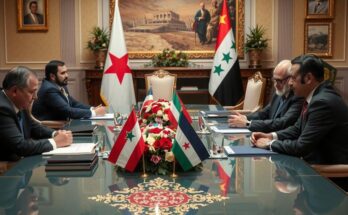The U.S. and UAE are exploring the possibility of lifting sanctions on Syrian President Bashar al-Assad, contingent on his distancing from Iran and Hezbollah. These talks, prompted by the imminent expiry of U.S. sanctions, aim to exploit perceived vulnerabilities in Assad’s position amid escalating rebel activity. The situation underscores the interplay between geopolitical alliances, regional stability, and implications for Syria’s reconstruction efforts.
The United States and the United Arab Emirates (UAE) are engaged in discussions regarding the potential lifting of sanctions on Syrian President Bashar al-Assad. This development is contingent upon Assad’s distancing from Iran and ceasing arms supply routes to Hezbollah in Lebanon. These discussions have intensified in recent months amidst the impending expiry of comprehensive U.S. sanctions on Syria, slated for December 20. Furthermore, the recent advance of anti-Assad rebels in Aleppo demonstrates a perceived vulnerability in Assad’s alliance with Iran, a situation that the U.S. and UAE seek to leverage. Although Iran has expressed its support for Assad, concerns linger over the senior Syrian leader’s stability should he opt for Iranian assistance to counter the rebel movement.
In addition to diplomatic maneuvers, the UAE’s history of rehabilitating Assad among predominantly Sunni Arab states is noteworthy, particularly following his help from Iran during the ongoing civil conflict. The Emirates had previously welcomed Assad in 2022 and have made numerous attempts to foster business relations with Syria, although efforts have been hampered by existing sanctions. Discussions about possible sanctions relief also highlight the strategic interests of both the U.S. and the UAE in reshaping Syria’s alignment with Iran. The sanctions that could potentially lapse include the stringent Caesar Act, which imposes significant economic restrictions on Syria and is seen as obstructive to reconstruction efforts in the war-torn nation.
This geopolitical landscape has been further complicated by regional dynamics, such as Hezbollah’s military focus shifting towards southern Lebanon and away from Syrian territory. The U.S. administration appears to recognize a tactical opportunity, whereby by offering sanctions relief, it may prompt Assad to recalibrate his alliance with Iran, thus using a “carrot and stick” approach to influence the situation. Iran, accordingly, remains wary of these developments, advising Assad against forsaking the alliance that has been crucial during times of conflict. Israeli statements reiterate their vigilance towards any attempts by Iran and Hezbollah to expand their influence and capabilities in the region, cautioning Assad against risky engagements with his traditional backers.
The backdrop of these discussions is the complex relationship between Syria, Iran, and regional players such as the UAE and Israel. Since the outbreak of the civil war in 2011, Assad has relied heavily on Iran and Hezbollah for military support to maintain his regime against various rebel factions. Additionally, the imposition of sever sanctions by the U.S. under the Caesar Act has severely impacted Syria’s economy, prompting Arab states to consider strategies to rehabilitate Assad while mitigating Iranian influence in the region. The upcoming expiry of these sanctions presents both a challenge and an opportunity for involved parties to reshape alliances and regional stability.
The ongoing negotiations between the United States and the UAE signify a strategic pivot towards possibly recalibrating Assad’s alliances away from Iran, contingent upon substantial political changes in Syria. The expiration of sanctions poses a crucial juncture for these diplomatic efforts, which aim to exploit perceived weaknesses in Assad’s position as evident from recent rebel advancements. While potential incentives for Assad emerge, Iran’s watchful stance underscores the delicate balance of power in the region and highlights the complexities of post-war reconstruction efforts that require broader political buy-in.
Original Source: www.usnews.com




